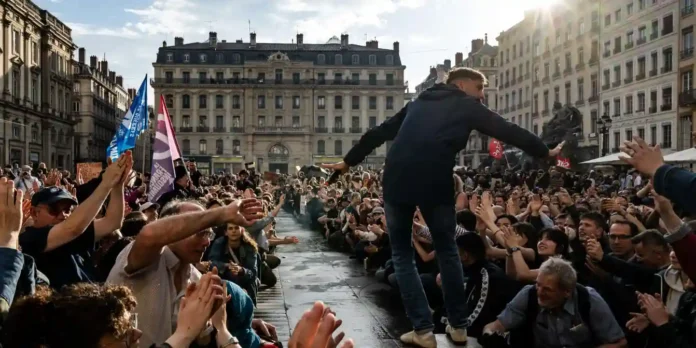
With the second round of parliamentary elections just days away, recent events involving anti-fascist activists have caught significant attention.
The Paris prosecutor’s office confirmed on Wednesday, July 3, that eight alleged members of the Jeune Garde (“Young Guard”), a group of anti-fascist activists aged between 20 and 30, have been placed under judicial supervision and charged with “group violence resulting in incapacity of more than eight days in a place of public passenger transport on the grounds of race, ethnicity, nation or religion.”
The incident, which took place on May 27, involved the assault of a 15-year-old boy at the Victor-Hugo station on metro line 2 in Paris.
According to the prosecutor’s office, the boy was approached by a group who questioned him about his relationship with Palestine, suspecting him of belonging to the Jewish Defense League.
This suspicion arose following an earlier attempt by members of the Jewish Defense League to disrupt an event held by pro-Palestinian activist and La France Insoumise candidate Rima Hassan at Paris-Dauphine University.
As reported by Le Canard Enchaîné, the teenager was subsequently beaten and coerced into chanting “Long live Palestine!” while the attackers recorded the incident and posted an audio recording on their Instagram account.
The recording has since been deleted. The young man’s medical-judicial examination concluded that he suffered “12 days of work incapacity” due to the “psychological repercussions” of the attack.
Following the teenager’s complaint on May 28, the investigation was referred to the regional transport safety authority. In a statement on its Instagram account, Jeune Garde acknowledged a “brief altercation” but denied any physical violence, stating that the organization has “always been committed to fighting anti-Semitism.” They criticized the “disproportionate means used to deal with a verbal altercation.”
The case has been widely shared by the far-right, with the Rassemblement National (RN) camp seizing the opportunity to highlight the actions of the anti-fascist group. The lawyer for the eight defendants, Tristan Soulard, maintained that his clients did not engage in any physical violence.
He explained that the incident was an altercation between pro- and anti-Palestinian groups that continued into the metro and ended after one station. Soulard also noted that the audio recording was posted on another antifa account, not Jeune Garde’s.
This incident has intensified the spotlight on the activities of anti-fascist groups in France, especially in the context of the upcoming elections.
The charges against the Jeune Garde members have sparked debates about the extent of violence and the appropriate response to ideological clashes.
The far-right has used the case to bolster its narrative against anti-fascist groups, while supporters of Jeune Garde argue that the response to the incident has been exaggerated.
As the investigation continues, the case underscores the tensions and divisions within French society, particularly regarding issues of race, ethnicity, and political activism.
The outcome of the judicial process will be closely watched, not only for its legal implications but also for its potential impact on the broader political landscape in France.
This article was created using automation technology and was thoroughly edited and fact-checked by one of our editorial staff members